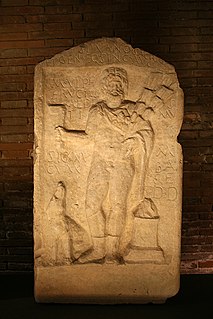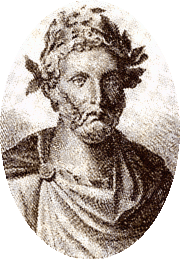
Servius Tullius was the legendary sixth king of Rome, and the second of its Etruscan dynasty. He reigned 575–535 BC. Roman and Greek sources describe his servile origins and later marriage to a daughter of Lucius Tarquinius Priscus, Rome's first Etruscan king, who was assassinated in 579 BC. Servius is said to have been the first Roman king to accede without election by the Senate, having gained the throne by popular support; and the first to be elected by the Senate alone, without reference to the people.
The year 509 BC was a year of the pre-Julian Roman calendar. In the Roman Republic it was known as the Year of the Consulship of Brutus and Collatinus. The denomination 509 BC for this year has been used since the early medieval period, when the Anno Domini calendar era became the prevalent method in Europe for naming years.

Numa Pompilius was the legendary second king of Rome, succeeding Romulus. He was of Sabine origin, and many of Rome's most important religious and political institutions are attributed to him.

Fidenae was an ancient town of Latium, situated about 8 km north of Rome on the Via Salaria, which ran between Rome and the Tiber. Its inhabitants were known as Fidenates. As the Tiber was the border between Etruria and Latium, the left-bank settlement of Fidenae represented an extension of Etruscan presence into Latium. The site of the arx of the ancient town was probably on the hill on which lies the contemporary Villa Spada, though no traces of early buildings or defences are to be seen; pre-Roman tombs are in the cliffs to the north. The later village lay at the foot of the hill on the eastern edge of the high-road, and its curia, with a dedicatory inscription to Marcus Aurelius by the Senatus Fidenatium, was excavated in 1889. Remains of other buildings may also be seen.

Lucius Junius Brutus was the founder of the Roman Republic and traditionally one of the first consuls in 509 BC. This followed his successful overthrow of the Roman monarchy. He was claimed as an ancestor of the Roman gens Junia, including Decimus Junius Brutus and Marcus Junius Brutus, the most famous of Julius Caesar's assassins.

Lars Porsena was an Etruscan king known for his war against the city of Rome. He ruled over the city of Clusium. There are no established dates for his rule, but Roman sources often place the war at around 508 BC.

Publius Valerius Poplicola or Publicola was one of four Roman aristocrats who led the overthrow of the monarchy, and became a Roman consul, the colleague of Lucius Junius Brutus in 509 BC, traditionally considered the first year of the Roman Republic.
Arruns Tarquinius L. f. L. n. was the second son of Lucius Tarquinius Superbus, the seventh and last King of Rome.
The Battle of the Cremera was fought between the Roman Republic and the Etruscan city of Veii, in 477 BC.
The Battle of Silva Arsia was a battle in 509 BC between the republican forces of ancient Rome and Etruscan forces of Tarquinii and Veii led by the deposed Roman king Lucius Tarquinius Superbus. The battle took place near the Silva Arsia in Roman territory, and resulted in victory to Rome but the death of one of her consuls, Lucius Junius Brutus.

Alba Longa was an ancient Latin city in Central Italy, 19 kilometres (12 mi) southeast of Rome, in the Alban Hills. Founder and head of the Latin League, it was destroyed by the Roman Kingdom around the middle of the 7th century BC, and its inhabitants were forced to settle in Rome. In legend, Romulus and Remus, founders of Rome, had come from the royal dynasty of Alba Longa, which in Virgil's Aeneid had been the bloodline of Aeneas, a son of Venus.
Spurius Lucretius Tricipitinus is a semi-legendary figure in early Roman history. He was the first Suffect Consul of Rome and was also the father of Lucretia, whose rape by Sextus Tarquinius, followed by her suicide, resulted in the dethronement of King Lucius Tarquinius Superbus, therefore directly precipitating the founding of the Roman Republic. It is believed that Lucretius and his accomplishments are at least partly mythical and most ancient references to him were penned by Livy and Plutarch.
The Roman–Etruscan Wars were a series of wars fought between ancient Rome and the Etruscans. Information about many of the wars is limited, particularly those in the early parts of Rome's history, and in large part is known from ancient texts alone. The conquest of Etruria was completed in 264 BC.

Titus Herminius, surnamed Aquilinus, was one of the heroes of the Roman Republic. He participated in two of the most famous conflicts that attended the birth of the Republic, and was elected consul in 506 BC. However, his greatest fame was won as one of the defenders of the Sublician bridge against the army of Lars Porsena, the King of Clusium.
The Tarquinian conspiracy was a conspiracy amongst a number of senators and leading men of ancient Rome in 509 BC to reinstate the monarchy, and to put Lucius Tarquinius Superbus back on the throne. The conspirators were discovered and executed. The story is part of Rome's early semi-legendary history.
The Roman–Latin wars were a series of wars fought between ancient Rome and the Latins, from the earliest stages of the history of Rome until the final subjugation of the Latins to Rome in the aftermath of the Latin War.
Not to be confused with the consul of 455 BC
The Roman-Aequian wars were a series of wars during the early expansion of ancient Rome in central Italy against their eastern neighbours, the Aequi.

The overthrow of the Roman monarchy, a political revolution in ancient Rome, took place around 509 BC and resulted in the expulsion of the last king of Rome, Lucius Tarquinius Superbus, and the establishment of the Roman Republic.












